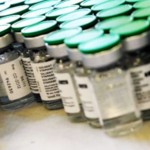 As many as several hundred thousand doses of two leading experimental Ebola vaccines could be ready by mid-2015, the World Health Organization said Friday, according to Reuters. Human trials for the treatment candidates are already under way, and another five drugs will begin clinical trials next year, the U.N. health agency said.
As many as several hundred thousand doses of two leading experimental Ebola vaccines could be ready by mid-2015, the World Health Organization said Friday, according to Reuters. Human trials for the treatment candidates are already under way, and another five drugs will begin clinical trials next year, the U.N. health agency said.
“Before the end of the first half of 2015 … we could have available a few hundred thousand doses,” the WHO’s Marie-Paule Kieny told reporters after a meeting in Geneva, where the organization is headquartered. “That could be 200,000. It could be less or could be more.” The two experimental vaccines come from GlaxoSmithKline and NewLink Genetics.
In the ongoing effort to contain the current Ebola outbreak, health experts around the world are pushing ahead with several experimental vaccines to head off the virus. There are currently no drugs or vaccines approved in the U.S. to prevent or treat Ebola, but several experimental drugs have been used in the current outbreak after the WHO said it was “ethical” to give unproven drugs to patients in West Africa. “In the particular circumstances of this outbreak, and provided certain conditions are met, the panel reached consensus that it is ethical to offer unproven interventions with as-yet-unknown efficacy and adverse effects, as potential treatment or prevention,” the agency said in August.
Doses of an experimental vaccine called ZMapp were sent to Liberia in August to treat three doctors who had become infected with Ebola. The drug, made from tobacco plants, is a kind of “cocktail” that prevents replication of the Ebola virus and triggers the body’s immune system.
Several health agencies in the U.S. and abroad have announced plans to develop experimental Ebola treatments, but the timeframes are still uncertain, according to the New York Times. About a dozen patients outside of West Africa have received experimental drugs. Nine patients in the U.S. have been given various vaccines, including the most recent case, a doctor in New York who contracted the virus in Guinea. Five of them have recovered, three are still in treatment, and one has died.
Source: International Business Times

















